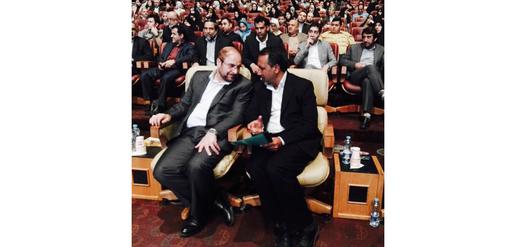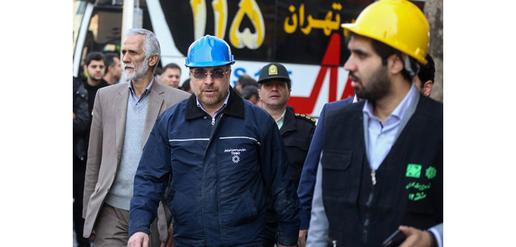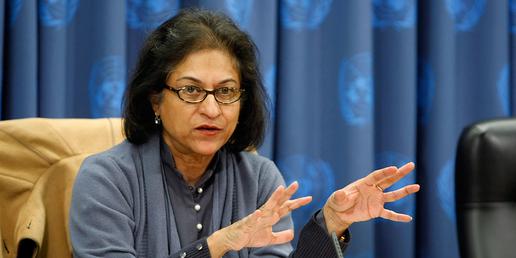On May 8, 2016, politician Mohammad Reza Rezaei, the representative-elect of Jahrom in Fars province, posted a photograph of himself sitting next to Tehran’s Mayor Mohammad Bagher Ghalibaf on Twitter. Ghalibaf had invited members of the outgoing 9th parliament and their families to dinner at Tehran’s landmark Milad Tower. Of those present, around 70, including Rezaei, had been re-elected to Iran’s 10th parliament in late February.
Forty days later, Rezaei was the head of parliament’s Rural and Urban Development Committee. After the City Councils Committee, the group is the most important body in parliament dealing with municipalities. In particular, over the last several months, the committee has handled Tehran Municipality matters, and matters pertaining to Mayor Ghalibaf.
After the May dinner party, reformist members sitting on Tehran’s City Council made their objection to the event obvious, labeling it “unethical.” But on May 14, 2016, Parliament Speaker Ali Larijani lauded Ghalibaf’s behavior as “generous and in good taste.” Furthermore, he said, “We should thank God that we have a good and wise mayor who knows how to organize the affairs of the city.”
“Astronomical” Corruption Case
Late in the summer of 2016, a corruption scandal hit the City Council and the municipality. Memari News reported on August 27 that it had acquired documents revealing that 1,100,000 square meters of government-owned property, including apartments and villas, had ended up in the possession of various individuals, including government officials, sometimes sold at a 50 percent discount. In what became known as “astronomical land deals,” many people were implicated, including individuals close to Speaker Larijani. The dinner party, it seems, had led to some very significant benefits for some. And it led to the arrest of at least two journalists after they reported on the alleged corruption, one of whom had worked for Memari News.
The scandal prompted parliament to get involved. Its executive committee, citing Article 214 of parliament bylaws, demanded that the Rural and Urban Development Committee investigate 21 representatives in connection with the deals. But the committee was unwilling to do so. Their first objection was that that, according to Proviso 7 of Article 214, “ongoing judiciary cases” cannot be investigated. The “astronomical land deals” case was such a matter.
Mayor Ghalibaf raised this issue himself in a meeting with the Rural and Urban Development Committee on November 13, 2016, and the committee went along with his argument. The speaker, however, wanted to avoid any appearance of favoritism and ruled that parliamentary and judiciary investigations were not mutually exclusive.
A “Mini” Corruption Case
But around the same time, another controversy emerged. In late September, Tehran Municipality distributed gift vouchers for high-end exercise facilities, each worth 500 thousand tomans, or around $150, to a number of parliamentarians. Representatives opposed to Ghalibaf hinted that the gift cards were a means of influencing the investigations into the land deals.
But Ghalibaf was not deterred. He met with representatives from Tehran in parliament and portrayed himself as just a nice guy who was above partisan politics. At that time, the newspaper Hamshahri, which is owned by Tehran Municipality, had been publishing headlines critical of the Rouhani administration, but Ghalibaf argued that the criticism was misplaced. Furthermore, he claimed that he had nothing to do with the arrest of Yashar Soltani, the editor-in-chief of Memari News, the news outlet that had broken the story about the shady land deals. He appeared to be taking on any opposition in any way he could. Not long after, parliament went about the business of discussing the next year’s budget, and the investigations slowed down.
Then, in January 2017, Tehran’s landmark Plasco Building burned down. The disaster took the lives of at least 30 firefighters and Ghalibaf’s reputation was at stake. Almost immediately, groups of Iranians went on Twitter and called for his resignation.
But hardliner media dismissed these protests and statements, labeling them as acts of “political vengeance” and claiming that reformist members of the City Council wanted to get rid of Ghalibaf for their own political gains. And Ghalibaf’s supporters actually used the disaster to boost his standing and power. The president of parliament’s Development Committee said that laws must be “updated” so the municipalities would have more power to prevent similar disasters in the future.
“How can we be of Service?”
Eventually, on January 31, Ghalibaf went to parliament and conceded that there were 120 deals involving properties owned by the municipality — but insisted that they were all completely legal. The next day he returned and defended his response to the Plasco Building disaster. Speaker Ali Larijani stood by him. “Mr. Ghalibaf was there from the early hours,” he said, and insisted that everything he had witnessed had suggested that the mayor had responded appropriately. He even asked Ghalibaf to outline to parliament what powers he needed “so that we can remove the legal obstacles.”
In the same session of parliament, Gholamali Jafarzadeh, a representative from Rasht, made his outrage over the matter clear, shouting at Ghalibaf and asking Larijani’s permission to formally address parliament. Larijani refused. The next day, Jafarzadeh told Borna news agency that he believed some parliamentarians were dedicated to Ghalibaf, and not to the nation.
The same day, Development Committee President Rezaei wrote a report that, according to one newspaper, at least partially praised the municipality and its officials.
On February 28, the Development Committee was scheduled to hear Ghalibaf’s final answers about the land deals and then reach a decision on the matter. But the mayor failed to arrive to answer questions. Nevertheless, in a hastily-arranged session, the committee voted 16-5 to end its investigations, letting Ghalibaf off the hook.
A “Dynamic” Mayor
Six days later, Speaker Larijani and Mayor Ghalibaf attended a tree-planting ceremony in Tehran. Larijani praised the municipality for dealing with the environmental problems of Iran’s capital and lauded Ghalibaf as “hardworking” and “dynamic.”
Eight days on from this, the entire parliament voted on the Development Committee’s motion to end investigations: 132 representatives approved, removing the investigations from parliament’s agenda.
“Mr. Larijani didn’t want the investigation to get yes votes,” said reformist Tehran representative Mostafa Kavakebian later. Mahmoud Sadeghi, another reformist representative from Tehran, criticized the Development Committee. Dr. Rahmatollah Hafezi, a member of Tehran City Council, “congratulated” Ghalibaf on the success of his lobbying and disclosed that the brother of a committee member had received a deal from the municipality worth more than $3 million, a claim also made by Mahmoud Sadeghi.
Committee chairman Rezaei responded quickly and angrily to the accusations. “This claim is an insult to parliament,” he said. “Tehran municipality did not dodge the requests for information by the committee. Based on the evidence...16 members of the committee decided that investigations were not necessary.”
Ten months on, the dinner at Milad Tower has proven to be a gift that keeps on giving.
visit the accountability section
In this section of Iran Wire, you can contact the officials and launch your campaign for various problems


























comments